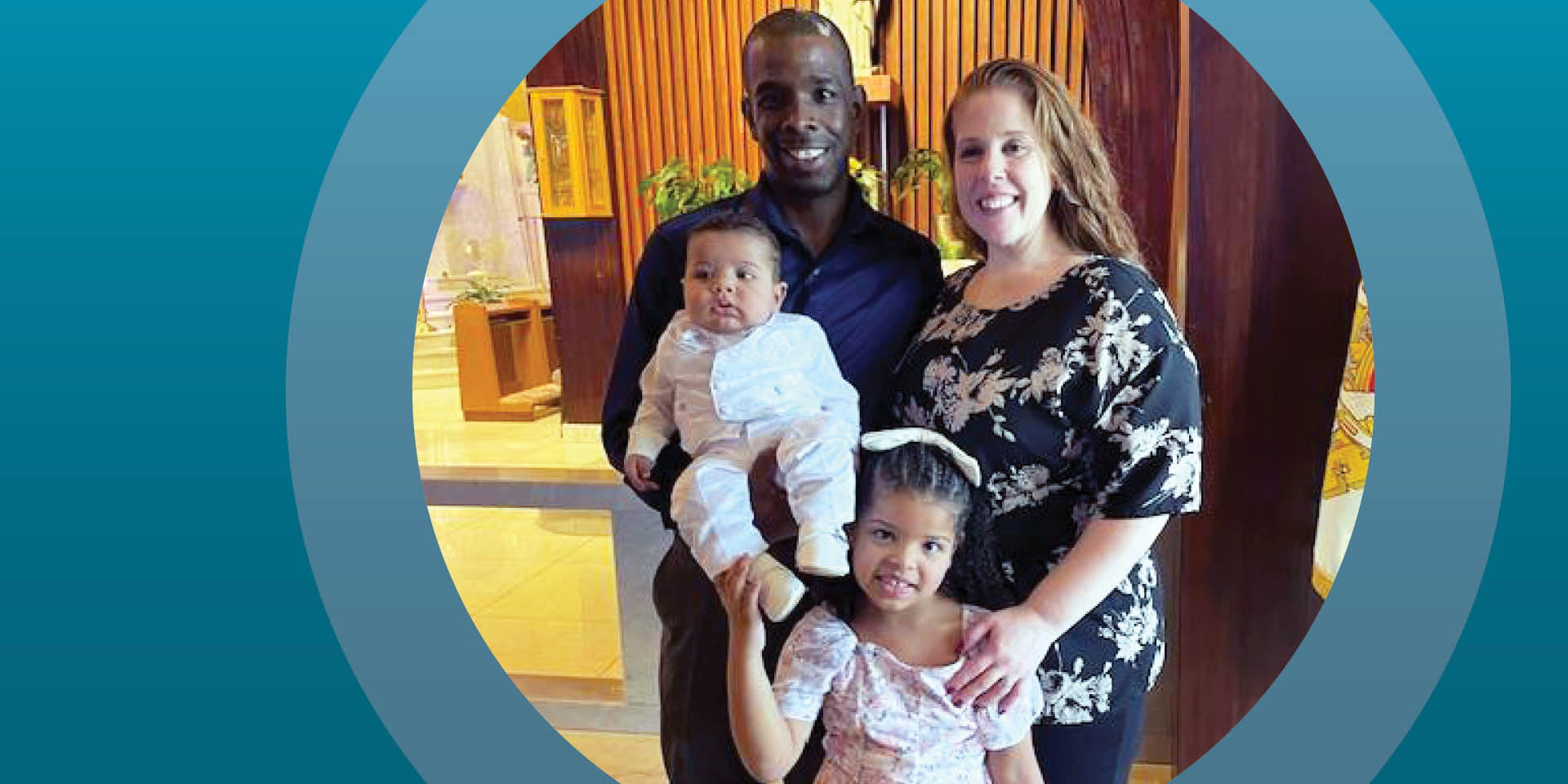Lauren Robinson, 36, was in the home stretch of her second pregnancy when she developed severe itching on her palms and the bottoms of her feet.
After speaking with her obstetrician, she went to the Doylestown Hospital Emergency Department (ED) as a precaution to make sure there were no issues with her pregnancy.
A Diagnosis of ICP
In the ED, Lauren’s blood work revealed the cause of her itching—elevated levels of bile acids due to a relatively rare liver condition called intrahepatic cholestasis of pregnancy (ICP).
Unrecognized ICP can lead to serious birth complications, the worst being stillbirth. Treatment may involve medication, or, as in Lauren's case, doctors may recommend delivering the baby early.
Adjusting to the Unexpected
Lauren's obstetrician admitted her to Doylestown Hospital for overnight monitoring and observation. Her baby would be delivered the next morning via a Cesarean section.
“At first, I was shocked,” says Lauren. “It was three weeks before my due date. I didn’t have anything with me and had no chance to prepare my daughter."
Fortunately, her husband, Ben, and other family members arrived, delivering the extra dose of love and support Lauren needed, along with her hospital bag.
Lucas is Born
The next morning, the Robinsons welcomed Lucas into the world. He weighed 7 pounds and was healthy but was struggling to breathe.
"Lucas took fluid into his lungs during the Cesarean-section, which takes time to resolve. In the interim, we admitted him to Doylestown Hospital's Level II Intensive Care Nursery, where we could provide respiratory support to keep his lungs open and relieve his distress,” says Shehla Siddiqui, MD, a Children's Hospital of Philadelphia (CHOP) Neonatologist and Medical Director of Newborn Care at Penn Medicine Doylestown Health.
Staffed around the clock by CHOP Neonatologists and Neonatal nurses, the ICN offers a higher level of care and a direct link to CHOP network resources and specialists.
Stepping into the Unknown:
The Robinson's ICN Journey Begins
Lauren recalls her first time in the ICN, “I was still groggy and struggling to comprehend what they were telling me about Lucas. The Neonatologist understood this. Not only did she sit with me, but she sat with my family members, explaining Lucas’ situation.”
Enhancing Outcomes with Family-Centered Care
According to Dr. Siddiqui, family-centered neonatal care empowers parents by involving them in their baby's care and decision-making. "The best part is that the parents get to spend lots of time with their babies," she says.
The Science of Touch—Kangaroo Care
Recognizing that nurturing touch plays a vital role in bonding, the ICN follows a research-based approach called Kangaroo Care.
“Kangaroo care involves placing a baby skin-to-skin on a parent's chest to promote bonding, stabilize vital signs, and support growth,” says Dr. Siddiqui. "In the ICN, we ensure the Mother or Father has an opportunity to hold the baby skin to skin within the first 24 hours, with the baby's interests always in mind.”
AngelEye Cameras Support Virtual Visits
"The cameras helped our family stay connected. It was comforting to watch Lucas from home,” says Lauren. The Robinsons also tuned in to join doctors on rounds, so they could stay involved with Lucas’ care when they couldn’t be there in person.
The AngelEye camera system was donated to Doylestown Hospital by The Superhero Project, as part of a larger program to ensure access for parents and families who cannot always be on site, according to Dr. Siddiqui.
Embracing Family Insights
"When a newborn needs intensive care, the family experience shifts dramatically," says Dr. Siddiqui. “Through our ICN Family Council, we collaborate with parents of former patients who provide valuable feedback on ways to improve the family experience.”
Changes made with parental input include:
Books for Babies — A little bookshelf in the ICN allows people to read to the babies.
Physician Pictures — The name and photo of the Neonatologist on duty are posted in the unit to help parents get to know them.
ICN Phone—The Neonatologists have a dedicated ICN phone for parents to call at any time.
Trial Run — Parents can sleep overnight with their baby in a hospital room before taking their baby home. The baby's monitor is removed, and parents can call ICN doctors or nurses if questions or concerns arise.
ICN Reunion—The first ICN reunion is planned for September 2025, bringing the parents and babies back together with the staff.
Happy at Home
Lucas went home after 10 days in the ICN, where his breathing was supported by a steady flow of oxygen into his lungs. A small collection of air outside of his left lung, called a pneumothorax, resolved without intervention, according to Dr. Siddiqui.
“We love having Lucas home, but the care and compassion of our doctors and nurses will forever stay with us," says Lauren.
About Penn Medicine Doylestown Health
Penn Medicine Doylestown Health is a comprehensive healthcare system of inpatient, outpatient, and wellness education services connected to meet the health needs of the local and regional community. The flagship of Penn Medicine Doylestown Health is Doylestown Hospital, a 245-bed not-for-profit, community teaching hospital with a medical staff of more than 600 providers who deliver the highest quality care in over 50 specialties. Renowned locally, regionally, and nationally, Doylestown Hospital provides superior healthcare and offers advanced surgical procedures, innovative medical treatments, and comprehensive specialty services. Serving Bucks County for over 100 years, Doylestown Hospital is proud to educate and train the next generation of physicians through its family medicine residency program.
About Doylestown Health's VIA Maternity Center
Doylestown Health's VIA Maternity Center is rated among the best in the region for maternity care with services available for every stage of pregnancy through the birth experience. The VIA Maternity Center features a 32-bed maternity unit that includes 9 labor, delivery & recovery rooms, 22 private post-partum rooms, and a Level II Intensive Care Nursery staffed by neontologists from the Children’s Hospital of Philadelphia.
